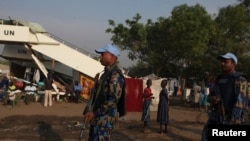Reports of violence are on the rise in camps for displaced people in South Sudan’s capital, Juba. Growing frustration with the ongoing conflict in the country is starting to wear on an already stressed and traumatized population.
Ten months after South Sudan erupted into violence stemming from a political dispute between the president and vice president, more than 1.5 million people remain displaced and, according to the United Nations; four million are still at risk of hunger.
Tokuma Kumaa is among the tens of thousands who escaped the violence in Juba in December last year by taking shelter at a U.N. base on the outskirts of town.
He describes what he considers the unbearable conditions of the camp, starting with the basic plastic sheet shelter he lives in.
“Those things are very hot in the daytime. It’s just like an oven. You can go inside and shelter yourself and you are waiting like you’re melting. And at night, it’s very cold, when it rains, it just rains inside,” says Kumaa.
Originally from Ethiopia, Kumaa says he came to South Sudan after being harassed in his home country, accused of belonging to an ethnic Oromo rebel group.
But he found that old rivalries among Ethiopians, as well as new tensions with other foreign nationals and South Sudanese, have made him again feel unsafe.
“Sometimes you disagree, you fight, you go on, everyone is angry, nobody is happy with the situation,” says Kumaa.
At the end of September, the U.N. says it halted “non-essential activities” at the Juba camps, following a series of attacks on humanitarian staff.
The sites have been closed off to journalists this past week. Aid workers have reported recent fighting between residents, continued threats against NGO workers, as well as an assault on a group of visiting photographers.
‘You feel the world is coming to an end’
Emmanuel Douglas, director of the South Sudanese humanitarian organization Health Link, which is running medical services in the IDP camp at Tomping, another U.N. base in Juba, says violence was a real problem during the early months of the conflict, as people crowded the camp, which became muddy and treacherous during the rainy season.
“It creates an environment where you feel the world is coming to an end,” says Douglas, adding that a scarcity of resources contributed to rising tensions.
“Everybody at that camp is really traumatized, going in there, seeing what is happening outside, and being in a very congested place, poor access to services, you can imagine more than 200 households share a toilet,” says he.
Douglas says the Tomping camp is quieter now, as most of the residents have been relocated to the base known as U.N. House.
While the rainy season has created misery inside the camps in the past months, it is the coming dry season that now has the U.N. worried, says the world body’s Humanitarian Coordinator for South Sudan Toby Lanzer.
“The dry season usually brings added violence, greater hardship, less opportunities for people to fish or farm, so the outlook right now is terribly bleak,” says he.
Lanzer says the international humanitarian response helped prevent a famine in South Sudan this year. But he warns next year could see a particularly harsh lean season.
“It is a very real possibility that we will see starvation on a scale that has never before been witnessed in this part of the world,” says Lanzer.
Meanwhile, renewed fighting in areas contested by the government and rebel militia is compromising humanitarian outreach.
Negotiators from both sides of the conflict have been meeting in Ethiopia to reach a peace agreement, although several past cease-fire deals have failed to hold.








